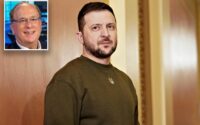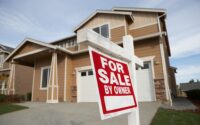Stocks tanked after Yellen ruled out ‘blanket insurance’ for bank deposits
Treasury Secretary Janet Yellen’s refusal to guarantee “blanket insurance” for all bank deposits looked like backtracking from her earlier assurances — and divided industry watchers as the a banking crisis continues to threaten the US economy.
At a Wednesday news conference, Federal Reserve Chairman Jerome Powell sought to reassure Americans that it is safe to leave money in their banks, even as the Fed continued to hike interest rates in a bid to tamp down inflation.
“We have the tools to protect depositors when there’s a threat of serious harm to the economy or to the financial system,” Powell said. “Depositors should assume that their deposits are safe.”
Yellen, meanwhile, caused alarm when she told lawmakers on Wednesday: “I have not considered or discussed anything having to do with blanket insurance or guarantees of all deposits.”

Yellen’s comments to the US Senate appropriations subcommittee on Wednesday came on the same day Powell announced an interest rate hike of a quarter point despite warnings from economists that it could have an adverse impact on the shaky banking system.
The Dow Jones Industrial Average — which had shed 1.63% on Wednesday, dropping 530.49 points to close at 32,030.11 — was recently up 226.57 points at 32,256.68. The Nasdaq composite was up 1.4% after falling 1.6% a day earlier while the S&P 500 was up 0.9% after dropping nearly 1.7% on Wednesday.
Bill Ackman, the hedge fund billionaire who runs Pershing Square, said that more people will withdraw their money from banks because Yellen “walked back” previous statements pledging government backstops for deposits.

“We have gone from implicit support for depositors to @SecYellen explicit statement today that no guarantee is being considered with rates now being raised to 5%,” Ackman tweeted on Wednesday.
“I would be surprised if deposit outflows don’t accelerate immediately,” Ackman added. “A temporary system-wide deposit guarantee is needed to stop the bleeding. The longer the uncertainty continues, the more permanent the damage is to the smaller banks, and the more difficult it will be to bring their customers back.”
Former Treasury Secretary Larry Summers, meanwhile, praised the Fed for hiking interest rates. He said that it was more important to fight inflation despite the ongoing banking crisis.
“This was the right choice,” Summers told CNN on Wednesday.

“If the Fed had stopped raising interest rates, when it clearly had a plan to increase interest rates, I think the risk would’ve been that it was signaling panic and alarm.”
“I probably would have allowed more room for concern about inflation and left the door a bit more open to multiple rate hikes, given the strength of the recent inflation data,” Summers told CNN on Wednesday.
Yellen’s remarks and Powell’s announcement were eagerly anticipated in light of the recent collapse of Silicon Valley Bank, Signature Bank of New York, and crypto-lender Silvergate Bank.

The banking world was shook again last week when struggling lender Credit Suisse was bought up at a steep discount by its Swiss rival UBS.
Analysts have also been scrutinizing attempts by US banking giants to rescue San Francisco-based regional lender First Republic Bank, whose stock plummeted last week after Standard & Poor’s Global Ratings downgraded its credit to junk status.
The instability of the banking system prompted some industry watchers to urge the Fed call off additional interest rate hikes — at least for now.

Elon Musk, the Tesla mogul whom Forbes currently ranks as the second richest person in the world with a net worth of $191 billion, slammed Powell on Wednesday for hiking interest rates to around 5%.
Musk, quipped on Twitter that ChatGPT, the artificial intelligence-powered chatbot developed by San Francisco-based tech unicorn OpenAI, “couldn’t do worse” than Powell if it ran the US central bank.
Musk has been a vocal critic of Powell and the Fed’s interest rate hikes.
On Wednesday, he called for the central bank to drop interest rates “by at least 50bps.”
Musk also agreed that the Federal Deposit Insurance Corporation should temporarily guarantee all deposits — including those that exceed the $250,000 threshold.


